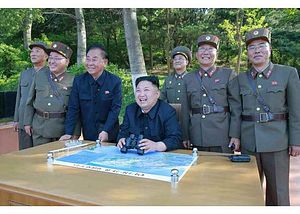Ever since U.S. President Donald Trump accepted Kim Jong-un’s invitation for a one-on-one summit meeting — a meeting scheduled to take place within 12 hours of this article being published — Korea-watchers had been quick to point out the dangers that lie embedded in that all important word “denuclearization.” The term, taken alone, means very different things to North Korea and the United States.
With just hours to go, there’s little evidence that U.S. negotiators have managed to extract a commitment from North Korea to anything but an ambiguous commitment to denuclearization. Indeed, the necessity of a last-minute meeting between the U.S. and North Korean summit negotiating teams led by Sung Kim, a former U.S. special representative on North Korea policy and an experienced negotiator, and Choe Son-hui, North Korea’s top diplomat for dealing with the United States, suggested that the agenda has yet to be fixed up.
But it’s more likely than not that the word “denuclearization” will appear in either a verbal press statement by Trump or, if talks go well, a short and modest joint statement. (Kim will not be exposing himself to a press conference.) For North Korea, “denuclearization” is but one component of talks with the United States; diplomatic normalization, momentum toward a peace treaty, and security assurances are all of greater importance.
As Kim departed for Singapore, North Korea’s state-run Korean Central News Agency noted that the objective of the summit would be to share “wide-ranging and profound views on the issue of establishing new DPRK-U.S. relations,” with “denuclearization” receiving a perfunctory mention.
Pyongyang knows, however, that commitments on denuclearization are the chief concessions it can proffer the United States to win positive inducements in other area. That remains true, even with Donald Trump across the negotiating table.
Trump and his lieutenants have been walking different lines on the agenda ahead with North Korea. For the U.S. president, expectations have fallen from the sky-high standards of early May, when Trump seemed to believe, for at least a fleeting moment, that North Korea would be coming to Singapore to turn the keys over to its nuclear program.
Instead, in recent days, Trump has said that the summit will be the start of a process and, that if nothing else results, it’ll be a positive outcome alone for the two leaders to have met. Mike Pompeo, Trump’s secretary of state, has emphasized that the long-sought but elusive objective of “complete, verifiable, irreversible denuclearization” (CVID) continues to be the goal coming out of the summit. (Pompeo’s spin on CVID here is subtly different from the classic formulation, where the ‘D’ stands for dismantlement—of all of North Korea’s weapons of mass destruction, depending on the speaker.)
Whatever will be said and not said tomorrow on “denuclearization” will be closely scrutinized — as it was in the aftermath of the April 27 summit meeting between South Korean President Moon Jae-in and Kim Jong-un. The “complete denuclearization” endorsed in that declaration is ambiguous and open-ended; it can be read as a commitment by the two Koreas to pursue a world without nuclear weapons.
I suspect that tomorrow’s declaration or statement in Singapore will make reference, if at all, to “complete denuclearization,” borrowing the language from Panmunjom. The ambiguity of that language and the fact that North Korea has already endorsed it at Panmunjom as part of the inter-Korean diplomatic track will make it appealing for both Kim and Trump.
For the U.S. president, the reality show-like pageantry of the Singapore summit is the chief concern. Walking away with a declaration on “complete denuclearization” will make for good headlines and only long-term Korea watchers, with a sense of what previous North Korean commitments on “denuclearization” incorporated, will know what was left on the table.
Trump and Kim are slated to meet for “up to two hours” in private, with their translators present, before expanding the ambit of the summit to incorporate their respective lieutenants. For Kim, one of the chief tasks from the summit — a legitimizing photo-op with a U.S. president — is now all but guaranteed.
But for Trump, even if Kim submits to an open-ended, unverified commitment to “complete denuclearization,” it’ll become apparent sooner or later that it was North Korea that ended up getting the better end of the deal — and that’s even before we get to other topics on the U.S.-North Korea agenda, including diplomatic normalization and the future status of U.S. forces in South Korea.

































